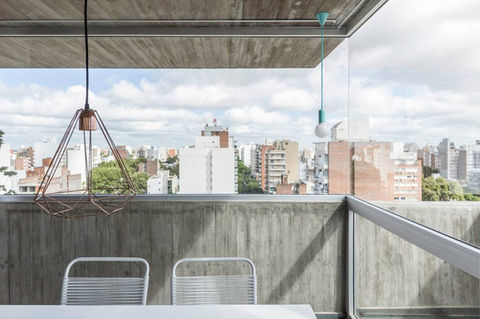2018 Americas Prize

Building Pueyrredon 1101
Arch. Pablo Gagliardo
Rosario, Argentina
February 2017
PRIMARY AUTHOR
Pablo Gagliardo
CONTRIBUTING AUTHOR
Sebastian Larpin (Project Designer) Lucía Galfione (Project Designer) Betiana Ferrero (Construction Manager)
CLIENT
OBRING S.A.
PHOTOGRAPHER
Ramiro Sosa
OBJECTIVE
Its structure, made of concrete with wooden board formwork, creates a pattern of additions and subtractions, as a game of “empty and full”. The main intention was to create cross visuals in the interior with a facade that became dynamic in the exterior, through large double-height balconies with trees. A double height entrance is projected, as a continuation of the public sidewalk with abundant vegetation and a bicycle rack, favoring a more sustainable life, in contact with nature. This way, entrance to the building takes place through a large "indoor plaza". This space links public and private life, providing permeability and urban connectivity, through its path and spatial and visual continuity. The building also has three different typologies per floor: studio, lofts and one-bedroom apartments, where the main premise is the spatiality and continuity of the interiors. They have their “wet areas” forming a common piece embedded in the central sector of the plan. The result is a pure and net space, emphasizing the condition of a mixed-use building responding to different demands, such as working or living. The interior design of the units offers free and bright spaces, so that the added value is on its balcony, posed as a continuous space in relation to the interior, by extending visual limits of the occupants. In its upper floors, the project has two levels with common spaces, green terraces and swimming pool, for social activities and recreation for dwellers and their guests, allowing impressive panoramic views of the city.
CONTEXT
The building is located at the intersection of two tree-lined and busy streets, a few meters from the main avenues and university centers of the city of Rosario, creating the ideal environment for young people and students. In this way, the building contributes to the city and real-estate market by responding to the increasing housing demand in the area for young professionals and university students from neighboring cities. The site is the northwest corner of a mid-rise and small-scale block. In this context, the building becomes a protagonist, being easily seen and recognized by people and vehicles which pass by. The city regulations allow the total occupation of the lot. This way, all the apartments can ventilate and open to the fronts, enhancing the direct connection between the street and the interior spaces of the apartment, plus, it also privileges the quality and natural illumination of the interior spaces.
PERFORMANCE
The building takes care of the local environment, contributing with urban design and new green areas, which exceed the ones that existed at the house previously on the site. Vegetation plays a central role, softening the dominant apparent concrete at the outside. The project aims to promote and provide green-living quality to its residents, by establishing a continuous interaction between its interior and the immediate environment. This is why, each unit is gifted with a sizable private outdoor space, acting also as a transition area between the vibrant public environment and the private atmosphere of each apartment. In the corner apartments, a unique spatial sensation is perceived by having the balcony to one side and the eaves to the other, this feeling is emphasized by the change of direction of the tables of the formwork. The ceilings are treated in the same way as the front of the balcony to generate solidity in the facades and provide continuity between the interior and exterior. For these reasons, the project adds architectural value to the real estate market, generating greater profitability by being a new offer, superior to other projects of the same character.











